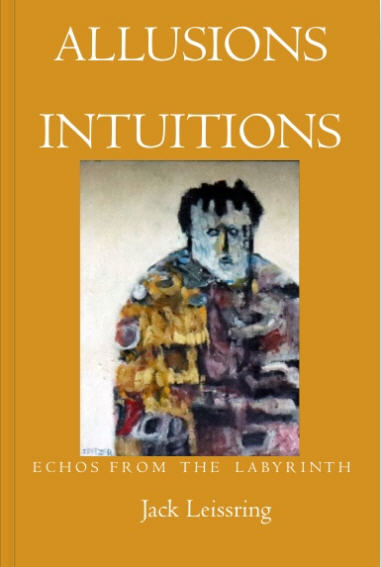Allusions and Intuitions: Echos from the Labyrinth
This book is a collection of essays. I am told, as you would also be told (by the prowess of Google and its employees), that the word essay derives from a French verb whose translated meaning is "an attempt." It is a transitive verb and needs an object for its action. This raises the question: what am I trying to, or attempting to, accomplish? What is the object of my essaying?
I have found that writing amounts to having discussions with myself--at least I believe it is myself to whom I silently talk as I write, on paper with pen or by typewriter, in the "old days," or now by computer keyboard. (I cannot imagine achieving any cogent result using "texting," my fingers are too large and the fingering too inaccurate). I do identify a causal stimulus for starting an essay as some form of emotion. This emotional neurophysiological link is essential to the process and in this link I find consilience with Antonio Damassio the neuroscientist who promotes emotions as decision-related factors in our lives. Applying Damassio's theory to myself, to my reality, it is not always possible to clearly identify emotions. It might be handy for pedagogy to place definitions in tight boxes, I experience a fuzzier world. I' feel' (if that is the right word) or 'see' (in the eye of my mind) a process similar to a cinematic display (but not really in pictures). I have called this process: 'running the movie.' And I often use it to reason (another fuzzy word) my way through a decision. Decisions, for me, are somehow connected to memories of similar events and my recollection of the outcomes. In this way, this collection of essays reflects reasoning about, thinking about, questions and problems of life as I experience it.
Well, this looks like a kind of self-analysis, and most of us know that analysis is another form of story telling. Whether one tells the story to another person--say an "analyst,"--or oneself , the activity is the same. There is something in forming word pictures and in processing thoughts that satisfies another something. I don't have words for these things, yet, when words are uttered, the resulting fantasy satisfies. Am I therefore making a return to the childhood? Stories we all experienced once: Santa, Tooth Fairy, the stories of religion that some kids learn? Jung thought that the complex rules of religion acted as foils against the emotional experiences which are related to religion--for a musician, the theories and rules of music/harmony similarly can impede the experience of music. The rules of psychology might impede the experiences of fantasy.
In the end, the causes I respond to are uncertain, and I just do it: the result is a book like this. My 'stories' are reported here as essays. They offer something to me--a collection of my stories placed in a readily accessible form, a book. I certainly hope that they might offer something of value to the reader.
Thank you for your curiosity.
ISBN: 979-8-9891705-4-8
Copyright JACK LEISSRING(Standard Copyright License)
Publisher: J. C. Leissring Fine Art Press
Copyright Year: © 2025
Language: English
Pages 389
Author(s): JACK LEISSRING
Binding Hard cover
Interior Color
Dimensions (inches) 6" wide x 9" tall
Price $85.00 available at
www.lulu.com
The author, Jack Leissring, has a vast collection of art, dating from 1600, that includes 472 artists. He is a retired physician (pathologist) a pianist, he paints, sculpts, draws, designs and builds dwellings and does etchings and woodcuts. He has written and published 43 books on a variety of subjects

